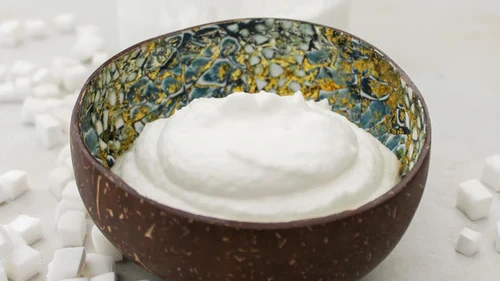Your Cart is Empty
Add description, images, menus and links to your mega menu
A column with no settings can be used as a spacer
Link to your collections, sales and even external links
Add up to five columns
Add description, images, menus and links to your mega menu
A column with no settings can be used as a spacer
Link to your collections, sales and even external links
Add up to five columns

Coconut yogurt made from frozen coconut chunks
Barb Hodgens

Pure coconut yogurt!
We’re forever exploring and experimenting with new ways to make coconut yogurt. Currently the Luvele recipe blog has six different methods catering to every dietary need. Most recipes call for canned coconut milk which is, unquestionably, easy and convenient. However, canning is an industrial process that requires high heat and diminishes some of the amazing, inherent enzymatic qualities of coconut.
At the other end of the spectrum we have our raw coconut yogurt, made completely from scratch. But, we know not everyone cares to hammer open drinking coconuts to get their daily dose of coconut yogurt!
So, we’re excited to bring you a frozen coconut method that is the equal of raw method nutritionally, without all the work. Look for frozen coconut chunks in the freezer section of your supermarket amongst the frozen fruit and berries. Freezing requires zero preservatives and locks in all the goodness. This method also turns out thick and dollopable yogurt without requiring any additional thickeners.

THIS METHOD REQUIRES A ROBUST HIGH-SPEED BLENDER!
The one essential piece of equipment required when making homemade coconut cream from coconut chunks is a high-speed blender. The smoothness of the cream will depend entirely on the power and quality of the blender blades. The Luvele Vibe Blender System gives you the smoothest coconut cream on the planet. Note: Over the course of blending, the blades will generate heat. Use the Luvele Stainless-steel jug instead of the plastic jug.

PREPARATION
Before you begin it is important to sterilise the yogurt making glass jar, lid and any utensils you use, in boiling hot water. The danger of not sterilising is that other bacteria may overpower your culture and affect the quality of your yogurt.

Luvele Rated 5.0 stars by 1 users We’re forever exploring and experimenting with new ways to make coconut yogurt. Currently the Luvele recipe bloghas six different methods catering to every dietary need. Most recipes call for canned coconut milk which is, unquestionably, easy and convenient. However, canning is an industrial process that requires high heat and diminishes some of the amazing, inherent enzymatic qualities of coconut. Pour the frozen coconut chunks into the Luvele Vibe stainless-steel blenderjug Add the boiled water (hot or cooled does not matter) and then blend on ‘nut mode’ for 2 minutes. Stop, remove the lid and scrape down the sides of the jug and inside the lid if necessary. Continue to blend for another 1 – 2 minutes. It is normal for the coconut cream to heat to between 60⁰ – 80⁰ C (140⁰ - 176⁰ F) while blending for this long. The coconut cream should be smooth and without grainy flecks. Pour the coconut cream into your yogurt making glass jar then set aside to cool below 43⁰ C (or 110⁰ F) Add the sugar (or honey) and starter culture and gently stir in. Pour water slowly into the base. (The water must not be filled over the ‘tall line’ indicated on the inside wall of the maker). Place the cover lid on top. Use the digital control panel to set the temperature to 38° C, the time to 12- 24-hours and then press ‘confirm’ to begin incubation. When complete, the coconut cream will be warm. Place the jar in the fridge for at least 6 hours to set. When the yogurt has chilled, stir with a spoon and then serve.

Coconut yogurt made from frozen coconut chunks
Ingredients
Directions
For more coconut yogurt methods try:
Coconut yogurt made from young drinking coconuts
Coconut yogurt made from Ayam coconut cream
SCD & GAPS coconut yogurt
Coconut yogurt thickened with gelatin (or Aga agar)
Coconut yogurt thickened with tapioca
Date sweetened coconut and cashew yogurt
PIN THIS RECIPE

Coconut yogurt made from frozen coconut chunks

Pure coconut yogurt!
We’re forever exploring and experimenting with new ways to make coconut yogurt. Currently the Luvele recipe blog has six different methods catering to every dietary need. Most recipes call for canned coconut milk which is, unquestionably, easy and convenient. However, canning is an industrial process that requires high heat and diminishes some of the amazing, inherent enzymatic qualities of coconut.
At the other end of the spectrum we have our raw coconut yogurt, made completely from scratch. But, we know not everyone cares to hammer open drinking coconuts to get their daily dose of coconut yogurt!
So, we’re excited to bring you a frozen coconut method that is the equal of raw method nutritionally, without all the work. Look for frozen coconut chunks in the freezer section of your supermarket amongst the frozen fruit and berries. Freezing requires zero preservatives and locks in all the goodness. This method also turns out thick and dollopable yogurt without requiring any additional thickeners.

THIS METHOD REQUIRES A ROBUST HIGH-SPEED BLENDER!
The one essential piece of equipment required when making homemade coconut cream from coconut chunks is a high-speed blender. The smoothness of the cream will depend entirely on the power and quality of the blender blades. The Luvele Vibe Blender System gives you the smoothest coconut cream on the planet. Note: Over the course of blending, the blades will generate heat. Use the Luvele Stainless-steel jug instead of the plastic jug.

PREPARATION
Before you begin it is important to sterilise the yogurt making glass jar, lid and any utensils you use, in boiling hot water. The danger of not sterilising is that other bacteria may overpower your culture and affect the quality of your yogurt.

:recipekit:
For more coconut yogurt methods try:
Coconut yogurt made from young drinking coconuts
Coconut yogurt made from Ayam coconut cream
SCD & GAPS coconut yogurt
Coconut yogurt thickened with gelatin (or Aga agar)
Coconut yogurt thickened with tapioca
Date sweetened coconut and cashew yogurt
PIN THIS RECIPE

Subscribe
Sign up to get weekly healthy recipes & information on new product releases.
Item is added to cart


